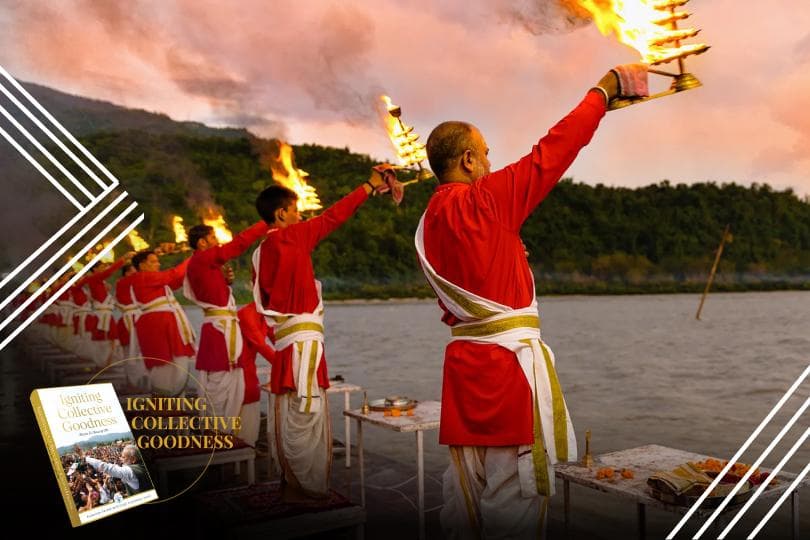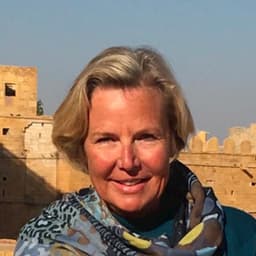Rivers of Unity
India's cultural symphony bridges divides through its vibrant natural heritage

In the chapter from Igniting Collective Goodness, "Small Details That Make India Big and Beautiful," there is a section titled "From Lesser-Known to Well-Loved Heroes," which reads:
“About the extraordinary impact of ordinary facts that the Prime Minister presents, Bibek Debroy says, ‘Earlier, I worked at NITI Aayog, and now I am the Chairman of the Economic Advisory Council to the Prime Minister. What has struck me is the moment you move away from the elite crowd, Mann Ki Baat resonates even more deeply. That is why Mann Ki Baat is such a great success. There have been isolated instances when a Prime Minister has spoken to the country, but those have generally been in emergencies or when a national catastrophe has struck. I don’t think a Prime Minister has ever, anywhere in the world, continuously talked to the citizens, sharing his thoughts and problems, or asking for suggestions. And that’s the reason Mann Ki Baat is such a great success. It shows governance involving citizens: Sabka Prayas.’” (Everyone’s Efforts)
I believe this idea, a direct dialogue, not monologue, with the leader of the world’s largest democracy and the population he governs, is a hallmark of today’s age of direct digital communication without filters, surrogates, or intermediaries. No one is decoding what the Prime Minister has said. No one is summarising the wishes of individual citizens. The communication is immediate, direct, raw, and unfiltered. The entire world of leaders and citizens should take note, request this of their leaders, and the leaders request access to the thoughts and voices of their people. The world would be a much better place. There is no grandstanding or performative jabber. There is respectful, insightful conversation, involving everyone, no matter their station, religion, tribe, or ideology. It is truly remarkable to see all of India on display this way.
The breathtaking span of topics and individuals included in Mann Ki Baat is staggering.
Everything from the Prime Minister mentioning a 93-year-old professor, J. Gendendharam of Mongolia, who in the last four decades has translated 40 ancient Indian texts, epics, and compositions into the Mongolian language, to Sagar Mule’s efforts in reviving the ancient tradition of Kaavi paintings in Goa.
The PM has emphasised the work of Bijay Kabiji from the seacoast of Kendrapara in Odisha, where, toiling for 12 years, he built a 25-acre mangrove forest on the outskirts of the village to prevent the devastation from high tides and cyclones. Modi also highlighted similar work in Paradip in the same region, which was carried out by Amresh Samant, who built micro forests to protect his village.
As Mann Ki Baat’s wide-ranging topics carry the central theme of raising up the diverse, complex society that is India, Prime Minister Modi reminded us of the ancient tradition of remembering and honouring rivers and paying homage to them and their central role in Indian culture.
“My dear countrymen,” begins the Prime Minister, “Pushkaram, Pushkarsala, Pushkaraha - have you ever heard of these terms? These are the different names for festivals organised for 12 different rivers across the country. One river every year, which means it would recur near that particular river after 12 years, and this festival is held sequentially for 12 different rivers spread across the country and it lasts for 12 long days. Just like the Kumbh festival, this festival also encourages the concept of national unity. It echoes the philosophy of Ek Bharat Shreshtha Bharat (One United India).”
The idea of encouraging national unity, through the celebration of the country’s most vital resource, water, is a powerful one indeed.
“When it comes to enumerating the lesser-known facts about our citizens, our nation, or our past, Prime Minister Modi has been vociferous. Notably, he has often expressed his heartfelt thanks to each and every listener of Mann Ki Baat for making it a success, enriching it, and staying connected with it.” - Igniting Collective Goodness, Chapter 16.



































